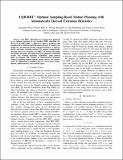LQR-RRT*: Optimal sampling-based motion planning with automatically derived extension heuristics
Author(s)
Perez, Alejandro; Platt, Robert; Konidaris, George; Lozano-Perez, Tomas; Kaelbling, Leslie P.
DownloadKaelbling_LQR-RRT.pdf (1.211Mb)
OPEN_ACCESS_POLICY
Open Access Policy
Creative Commons Attribution-Noncommercial-Share Alike
Terms of use
Metadata
Show full item recordAbstract
The RRT* algorithm has recently been proposed as an optimal extension to the standard RRT algorithm [1]. However, like RRT, RRT* is difficult to apply in problems with complicated or underactuated dynamics because it requires the design of a two domain-specific extension heuristics: a distance metric and node extension method. We propose automatically deriving these two heuristics for RRT* by locally linearizing the domain dynamics and applying linear quadratic regulation (LQR). The resulting algorithm, LQR-RRT*, finds optimal plans in domains with complex or underactuated dynamics without requiring domain-specific design choices. We demonstrate its application in domains that are successively torque-limited, underactuated, and in belief space.
Date issued
2012-05Department
Massachusetts Institute of Technology. Computer Science and Artificial Intelligence Laboratory; Massachusetts Institute of Technology. Department of Electrical Engineering and Computer ScienceJournal
Proceedings of the 2012 IEEE International Conference on Robotics and Automation
Publisher
Institute of Electrical and Electronics Engineers (IEEE)
Citation
Perez, Alejandro, Robert Platt, George Konidaris, Leslie Kaelbling, and Tomas Lozano-Perez. “LQR-RRT*: Optimal Sampling-Based Motion Planning with Automatically Derived Extension Heuristics.” 2012 IEEE International Conference on Robotics and Automation (n.d.).
Version: Author's final manuscript
ISBN
978-1-4673-1405-3
978-1-4673-1403-9
978-1-4673-1578-4
978-1-4673-1404-6